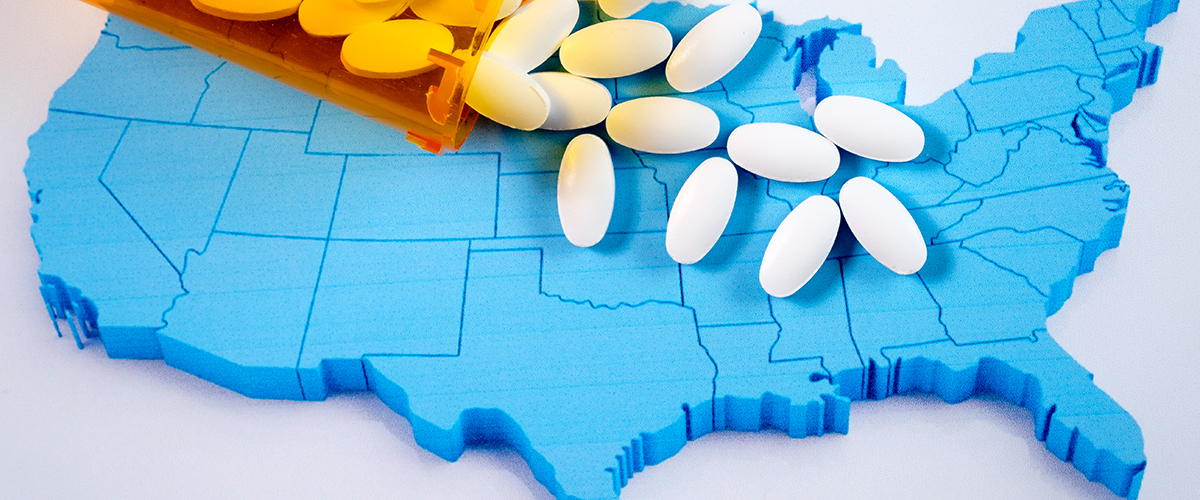Legalizing marijuana can help address the nation’s opioid addiction and fatal overdose crisis, suggest the findings of two new studies.
The United States could put a dent in its opioid abuse crisis if it were to legalize marijuana, suggest the findings of two studies published recently in JAMA Internal Medicine. While the new studies don’t directly assess the effect of legalizing marijuana on opioid addiction and overdose deaths, they do provide evidence that legalizing marijuana may reduce the prescribing of opioids. The findings suggest that, where marijuana is legally available, patients are using cannabis as a safer alternative to opioids for managing pain.
In the first study, researchers Hefei Wen from the University of Kentucky and Jason Hockenberry of Emory University found that the passing of marijuana laws were followed by reductions in Medicaid opioid prescription rates. Legalizing medical marijuana was associated with a 5.88 percent drop in opioid prescriptions, while legalizing recreational marijuana was followed by a 6.38 percent reduction.
“Marijuana liberalization may serve as a component of a comprehensive package to tackle the opioid epidemic,” the researchers concluded.
In the second study, researchers Ashley Bradford, W. David Bradford, and Amanda Abraham at the University of Georgia found that legalizing medical marijuana at the state level was associated with an 8.5 percent drop in the number of daily opioid prescriptions that were filled under Medicare Part D, relative to states without legalized medical marijuana. States that allow patients to purchase medical marijuana from dispensaries saw a higher, 14.4 percent, reduction in opiate prescriptions. States that permit home marijuana cultivation experienced a 6.9 percent reduction in opioid prescriptions.
“These findings further strengthen arguments in favor of considering medical applications of cannabis as one tool in the policy arsenal that can be used to diminish the harm of prescription opioids,” the study concluded.
Both research teams called for states and the federal government to fund more studies to clarify the effect of marijuana use on opioid use.
Severity of the U.S. Opioid Crisis
More than 64,000 Americans died from drug overdoses in 2016, including illicit drugs and prescription opioids, according to data provided by the Centers for Disease Control and Prevention. That’s nearly double the number of fatal overdoses a decade ago.
“In this time when we are so concerned – rightly so – about opiate misuse and abuse and the mortality that’s occurring, we need to be clear-eyed and use evidence to drive our policies,” said W. David Bradford, one of the authors of the second study. “If you’re interested in giving people options for pain management that don’t bring the particular risks that opiates do, states should contemplate turning on dispensary-based cannabis policies.”

Alternatives for pain management have been a topic of focus in the effort to address the opioid epidemic. The legalization of cannabis, which has shown to be safe and effective for managing chronic pain, has often been suggested.
“Marijuana is one of the potential, non-opioid alternatives that can relieve pain at a relatively lower risk of addiction and virtually no risk of overdose,” Wen, author of the first study, said.
Marijuana remains illegal in the U.S. at the federal level. Twenty-nine states have passed their own policies permitting medical marijuana in defiance of federal law. Eight of those states have also legalized recreational marijuana.
Resistance to Cannabis as Alternative
The findings in both studies are consistent with those of numerous prior studies that have linked cannabis access to reduced rates of opioid use and abuse, opioid-related hospitalizations, and fatal opioid overdoses.
While Americans accept marijuana, the Donald Trump administration remains resistant to considering marijuana as a potential partial solution to the opioid crisis.
U.S. Attorney General Jeff Sessions has made moves recently indicating his intentions to crack down on state-legal marijuana. He made efforts to encourage Congress to remove the federal protections that prevent his Justice Department from going after state-legal medical marijuana, and only months ago rescinded an Obama-era policy that had directed federal prosecutors to not prioritize recreational marijuana cases.

Sessions has also suggested that cannabis is a gateway drug that contributes to the opioid crisis, although this myth has been debunked, and that pain patients should “tough it out” and take over-the-counter aspirin for pain management instead. Recently, he urged federal prosecutors to seek the death penalty in some drug cases.
The attorney general’s attack on cannabis has made some doctors in states where medical marijuana is legal to be hesitant to recommend the treatment to patients.
Find More Cannabis Industry News
You can learn more about cannabis’ efficacy for pain management by visiting our education page. Keep up with the latest cannabis industry updates through our news page.






